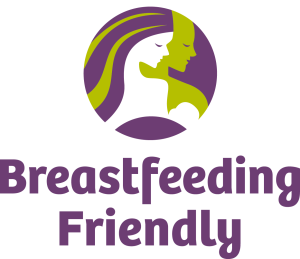
How to be a Breastfeeding Friendly employer
Supporting breastfeeding women when they return to work can make a huge difference to families and bring benefits to employers, families, mums and babies.
Studies have shown that employers who provide a breastfeeding friendly workplace benefit by
- Reduced staff turnover²
- Reduced time off for illnesses, as breastfeeding has significant benefits for the health of both women and babies¹
- Higher job satisfaction and increased morale and loyalty from employees²
If you are an employer who would like to demonstrate that you are breastfeeding friendly why not join our Breastfeeding Friendly scheme? You can print off the posters and certificate of commitment to display in your premises. You can also buy Breastfeeding Friendly window stickers from our online shop or we can send you an electronic version to add to your website to show everyone you support and value breastfeeding.
There are a few different things employers can do to support breastfeeding mums in the workplace
- Be flexible about working time and breaks to allow a mum to either express milk or to feed her baby during the working day (either by her baby being brought to her or by using a nursery close to her workplace so she can visit during the day)
- Have an easily accessible, written breastfeeding and returning to work policy can help a mum who may otherwise feel anxious about raising the subject of breastfeeding with her manager. The policy could be a specific breastfeeding policy, or it could be a section within the maternity policy. Having a written policy also makes it easier for all managers and staff throughout the company to know what is expected and the type of support that should be offered.
- Make a private room available for expressing and a refrigerator to store the milk. This doesn’t need to be a specific room set aside just for this purpose, but it does need to be somewhere the mum will not be disturbed and it must not be a bathroom.
It is also worthwhile remembering that women choose to breastfeed for different lengths of time and that there is no specific age that a baby no longer needs to breastfeed. The NHS in the UK recommends that babies have ‘nothing but breastmilk until they are six months old and then that breastfeeding continues until two years old or beyond, or for as long as a woman wishes to continue’. The support a mum needs if she returns to work when her baby is under six months old is likely to be different to the support a mums needs if she is returning when her baby is 12 months old, but every baby is different so flexibility and talking about what will help is vital.

The links below have lots of information about the law concerning women returning to work who wish to continue breastfeeding and they should help you be able to prepare a policy that will work for your business or organisation.
http://www.hse.gov.uk/pubns/indg373.pdf
http://www.hse.gov.uk/mothers/law.htm
http://www.workingfamilies.org.uk/articles/returning-to-work-while-breastfeeding-a-guide-to-the-law/
References
- Cohen, R. Mrtek, MB, Mrtek RG. American Journal of Heatlh Promotion 1995; 10:148-5
- United States Breastfeeding Committee. Workplace Accommodations to Support and Protect Breastfeeding. Washington, DC: United States Breastfeeding Committee; 2010.
Click here to view this information as a printable pdf.

